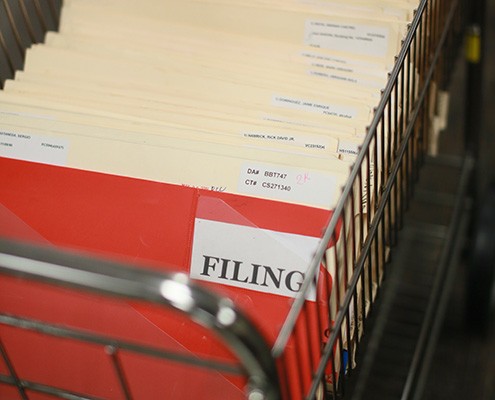| 2015 Staffing | |
|---|---|
| Attorneys | 13.5 |
| Investigators | 0 |
| Paralegals | 5 |
| Paralegal Supervisor | 1 |
| Paralegal Interns | 1 |
| LSM | 1 |
| Support Staff | 19 |
| Legal Interns | 1 |
| Student Workers | 5 |
| Total | 46.5 |
The Case Issuance and Extradition Division is overseen by Chief Susan Gust and Assistant Chief Chief Dino Paraskevopolous as well as Legal Support Manager Ella Bookwalter and Paralegal Supervisor Diane Alvarez. The division is comprised of the following units:
- Felony Issuing & Priors Unit
- Domestic and International Extraditions Unit
- Lifer Hearing Unit
- DA Liaison Unit
Felony Issuing and Priors Unit
This unit reviews police reports submitted by various law enforcement agencies that document criminal activity in the Central Judicial District of San Diego County. Case Issuance attorneys evaluate the cases for charges and file felony criminal complaints for general prosecution. They may also refer cases for vertical prosecution by a specialized unit within the District Attorney’s Office, or to another prosecuting agency, when appropriate. Our staff works closely with the City Attorney’s Office to ensure cases are properly brought as felonies or misdemeanors. Last year, attorneys in this division reviewed 3,184 felony cases for issuing. We issued 2,221 felony cases, rejected 394 cases and redirected 569 cases to other prosecuting agencies. Our busy clerical staff processed all of those cases as well as the other cases handled by specialized units throughout the central division, for a total of 6,098 cases. They process amended complaints and information and prepare grand jury indictments
Proposition 47, which was passed in November 2014, provided an avenue for defendants or their counsel to petition for the reduction of felony charges to misdemeanors. Our staff processed the tremendous number of petitions for resentencing and alterations to complaints and information in unresolved cases which were impacted by that sweeping legislation. The attorneys also handled a variety of legal issues and provided legal advice on criminal law, procedure and evidence to the various law enforcement investigators who submit cases to our office for consideration.
The Priors Unit obtains certified court documents for the entire District Attorney’s Office. Prior convictions can elevate criminal conduct to the felony level, provide specific requirements for sentencing and elevate a defendant’s custody exposure so defendants with criminal records are given a commensurate sentence. Documents are obtained from the courts throughout San Diego County, including juvenile court, as well as from other counties, states and federal courts.
CODIS DNA Hit/DA Case Management System Integration Project
The Combined DNA Index System (CODIS)/DA Case Management System is a grant funded program that pairs one assigned Deputy District Attorney to work collaboratively with the San Diego Police Department Crime Lab and the San Diego Sheriff’s Department Crime Lab. The program links DNA evidence from an unknown suspect that has been analyzed by criminalists and a DNA profile is identified, with other profiles lodged with the statewide Regional Information Sharing System (RISS/Net). This exciting project combines technology and science to achieve a greater measure of justice for San Diego victims in previously unsolved crimes. As a direct result of this new collaborative project with law enforcement, several felons who had pending felony cases have been tied to older, unsolved crimes. At the onset of the project, our Information Technology Division modified our electronic case management system to electronically import 5,500 CODIS matches or “hits” directly from our two crime labs. We continue to receive downloads of all new CODIS hits on a bi-weekly basis. This technology allows our office to effectively manage, mine, and track the voluminous DNA data from unsolved crimes and it gives our prosecutors real-time information about open CODIS hits related to defendants they have previously or are currently prosecuting. To date, our office has input over 6,240 hits into our database.
eDiscovery
Our office continues to utilize and improve our eDiscovery program. We scanned more than 5.6 million pages of discovery last year (police reports and other documentary evidence) into an electronic format. More than 1,200 private attorneys and the Offices of the Public Defender and Alternate Public Defender receive discovery via eDiscovery in adult criminal matters. The program allows us to provide discovery in a cost effective and a timely manner and is a model for other District Attorney Offices across California.
Our office worked in conjunction with the San Diego County Technology Office, The San Diego Superior Court, Court Reporters with the San Diego Superior Court, and the San Diego County Probation Office to create an electronic process for delivering preliminary hearing transcripts. Virtually all preliminary hearing transcripts are now seamlessly delivered electronically into our case management system. This a considerable reduction in the amount of paper generated by court reporters.
Domestic and International Extraditions
The unit brought 100 defendants from other states back to San Diego to address pending criminal matters. Extradition prosecutors also handled 75 hearings to send 50 fugitives caught in San Diego to other states, as well as citizen identity hearings and other related hearings. Two international fugitives were extradited to San Diego – a serious and violent offender from Mexico and a defendant facing serious narcotics charges from Canada. Since 2008, the unit has extradited 25 fugitives from Mexico, all serious and violent offenders. Also last year, one fugitive was arrested in Mexico pursuant to our provisional arrest warrant and formal extradition request. There are currently five fugitives in federal custody in Mexico pending extradition at various stages of the extradition legal process. All of these fugitives are wanted to stand trial in San Diego for allegedly committing serious and violent offenses, including murder.
Bail Bond Cases and Extradition
When a defendant who is out of custody on bail flees the jurisdiction, the law allows for the reimbursement of the costs associated with the extradition to be obtained from the bond before the bond is exonerated. The office received $91,560 in extradition reimbursements for agencies that transported defendants to San Diego County.
Lifer Hearing Unit
The DA’s Lifer Hearing Unit has two main goals: to ensure that dangerous prisoners with life sentences are not released carelessly or improvidently and to ensure that crime victims and their families are given an opportunity to participate in the parole hearing process and have their voices heard.
When a defendant is sentenced to life in prison, the Lifer Hearing Unit processes the case to ensure that it is ready for future parole suitability hearings. This involves preserving victims’ statements and documenting the gravity of the crimes to ensure the offenders serve sentences proportional to their crimes.
Last year, there were 333 lifer parole hearings scheduled. Of those, 68 inmates received parole grants from the California Board of Parole Hearings. The remaining inmates were denied parole or received postponements or stipulations to parole denial. Seventeen parole grants were overturned by Governor Edmund G. Brown. Despite the statewide shift toward more parole grants, San Diego County maintains a lower grant rate than other counties with no Lifer Unit.
In addition, the Lifer Hearing Unit tracks court activity on lifer cases and assists the Attorney General’s Office in opposing writs of habeas corpus seeking release. The Lifer Hearing Unit also submits amicus briefs on behalf of the California District Attorneys Association on important cases. In 2015, the Lifer Hearing Unit filed an amicus brief in the Ninth Circuit Court of Appeals on Gilman v. Schwarzenegger matter in which the lower court overturned the longer parole hearing denial times in Marsy’s Law as ex post facto. That matter is now pending a decision from the Ninth Circuit. The unit is also the statewide leader and San Diego County serves as the training office for other prosecutors who seek to understand the complex and ever-changing laws governing parole hearings. In 2015 the CDAA Lifer Hearings Manual was published with our county serving as Editor in Chief.
In addition, due to the prisoner release order by the Three Judge Court in the Coleman v. Brown litigation, the Lifer Hearing Unit also handles elder parole hearings, youthful offender parole hearings and expanded medical parole hearings, on both indeterminately and determinately sentenced inmates. Due to the same litigation, the Lifer Hearing Unit screens applications for increased credits for non-violent second striker convictions and sends letters opposing the award of increased custody credits where appropriate. The unit screened 453 referrals in 2015 and received decisions on 319 inmates. Approximately 43 percent of the applications received increased credits.
The Lifer Hearing Unit also screens applications for pardons and executive clemency. We received about 60 applications and letters of objection last year. About seven applications were granted.
DA Liaison Unit
Two experienced prosecutors are assigned as liaisons to local law enforcement agencies including the San Diego Police Department, the San Diego Sheriff’s Department and many smaller police agencies within the county. These prosecutors work closely with law enforcement and assist with investigations by providing critical support in assuring evidence is collected lawfully so it can be introduced in court by the prosecutors. They help police with drafting legal documents such as search warrants, arrest warrants, and other court orders. The DA liaisons are available seven days a week, 24 hours a day, to answer legal questions. This year, the unit was responsible for collaborating with law enforcement and the court to respond to legislative changes. We worked with law enforcement and criminal justice stakeholders to integrate the high volume of body worn camera evidence with our cases.
Realignment and Collaborative Courts Unit
The Criminal Justice Realignment Act – known as AB 109 – went into effect in October 2011, shifting the supervision, housing and treatment of felony offenders from the state to the county. This created a new population of offender and a shift in how the county and the court address sentencing and re-entry into the community. To provide a uniform and consistent response to this, the Realignment and Collaborative Courts Division was created.
This unit advocates for the best solutions to protect public safety while transitioning offenders back into the community with treatment and supervision to reduce the likelihood of recidivism. We provide training on all legal aspects of AB 109 and evidence-based practices. We represent the District Attorney’s Office on the Behavioral Health Court, Central Drug Court, Reentry Court, Veteran’s Treatment Court, Homeless Court, and Veterans Stand Down. This unit also staffs the multi-disciplinary team meeting for the recently developed Vista Detention’s Center Veterans Housing Module, and provides a link between the team and the court process.
California voters passed Proposition 47 in November 2014, which enacted the “Safe Neighborhoods and Schools Act.” It makes non-serious, nonviolent crimes misdemeanors instead of felonies including petty theft and drug possession, unless the defendant has prior convictions for specified violent or serious crimes. In addition, the law authorizes consideration of resentencing for anyone who is currently serving a sentence and reclassification as a misdemeanor for qualifying offenses. Our division worked collaboratively with justice partners and the IT Department to prepare for the new law. We are responsible for reviewing petitions for eligibility, resentencing eligible offenders, conducting dangerousness hearings and litigating legal issues created by the law. In 2015, we processed 22,210 petitions and resentenced 15,555 cases.
Additionally, this unit is responsible for handling all post release community supervision revocation matters and acting as the office wide liaison with the Probation Department’s Post Release Offender Unit. The PRCS revocation calendar sees approximately 40-50 offenders per week.
A Collaborative Courts Deputy District Attorney continues to staff San Diego’s Mandatory Supervision Court, which leads the state in creatively and effectively supervising, treating and stopping the revolving door of recidivist offenders who receive split sentences. There are about 650 participants in the program. The increase in the number of offenders on Mandatory Supervision has led to the addition of a second weekly court calendar. Participants are brought to court about four weeks before their release from custody to review the terms of supervision which are guided by their assessment and case plan (e.g., residential/outpatient treatment, cognitive behavioral therapy, job training, mental and physical health, etc.). Upon release they will reside in a home that has been pre-approved by probation or they will live in a residence provided by a treatment program or sober living facility. Participants must submit to random drug testing, meet with mental and physical health professionals and take prescribed medication if necessary. They meet regularly with their probation officers, must successfully complete programs they’re enrolled in, and attend follow-up court dates to provide the court with information on how they are progressing in their treatment plans. If they are in violation of the terms of their mandatory supervision, then they will be arrested and placed back into custody. They will then be brought back before the court where a decision will be made on whether they should be given another chance to be supervised in the community or return to custody for the remainder of their sentence.
In July of 2013, the court was tasked with handling all parole revocations. We assigned a Deputy District Attorney to take on the new project and learn this complex area of law. This Deputy DA handles all parole revocation matters and is the liaison between the California Department of Corrections and Rehabilitation’s Department of Adult Parole and our office. All parole revocation hearings are conducted in the San Diego Superior Court. We represent the prosecution in the parole revocation process and promote public safety. Supervised parolees who may appear in Parole Court include felons released from state prison, high-risk sex offenders, murder, and three strikes sentence. The majority of parole revocations in court are initiated by the Parole Department; however, a revocation can be initiated by the District Attorney’s Office. By law, if we are successful in revoking a parolee’s parole, we can seek a jail term of up to 180 days along with other sanctions such as GPS monitoring, drug and alcohol programs and sex offender treatment programs.
Central Drug Court: Despite the loss of several participants due to Proposition 47, Central Drug Court has been able to maintain a client base close to the capacity of 86 clients. However, the profile of people accepted to the program has changed. Offenders with a history of mental illness and drug abuse (co-occurring disorders) are now accepted into the program. This creates a negative financial impact to the program because of the greater need for housing, treatment and support. Thirty-three participants graduated from Central Drug Court this year.
Reentry Court: The number of participants in Reentry Court remains low, at about 35 to 40; the program is authorized to accept 86. As with Drug Court, we lost participants due to Proposition 47 and the profile of accepted clients was expanded to accept people with more serious criminal records and co-occurring disorders. There has also been an expansion to accept defendants on mandatory supervision and parole revocations. Seven participants graduated from Reentry Court this year.
Homeless Court/Stand Down: Homeless Court continues to operate efficiently and effectively one day a month at St. Vincent DePaul Village or Veterans Village of San Diego. We participated in Stand Down, an event that takes place every summer. Stand Down is an innovative program to help get local homeless veterans off the streets and back on track. The District Attorney’s Office worked with the Public Defender’s Office to resolve minor outstanding criminal matters of the attending Veterans.
Veterans Treatment Court: 2015 marked the first full year of permanent operation for the San Diego County Veterans Treatment Court, which originally started as a pilot program in 2011. This cutting edge collaborative justice project is designed to assist veterans who commit crime as a result of mental illness or substance abuse stemming from military service. Treatment providers from the military community join with the Superior Court, Probation Department, defense attorneys, and District Attorney’s Office to create customized rehabilitative plans for each Veteran. The program strives to reintegrate veterans into law abiding society. Last year, the Veterans Treatment Court saw its highest level of participants since the program started. Up to 46 participants were involved in treatment at any one time. Ten veterans successfully graduated from the program, which typically lasts from 18 to 36 months. In addition, 10 veterans successfully had their cases expunged and rights restored as a result of their rehabilitative efforts and community leadership demonstrated through this collaborative court.




